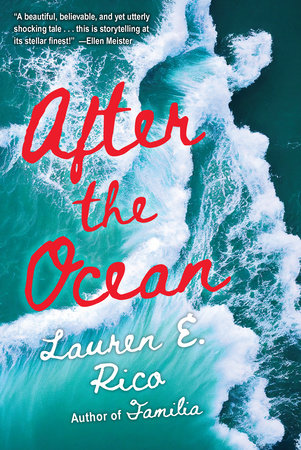
Lauren E. Rico, a well-established classical music broadcaster and author of “Familia,” published her latest novel, “After the Ocean,” on Dec. 24, 2024. “After the Ocean” is a mystery with a distinctive plot that had me poring over the novel for hours, finishing it after only two sittings.
The synopsis describes a tragic event aboard a cruise ship 30 years ago during Emilia Oliveras’ honeymoon with her husband Paul Winstead when he suddenly disappears. Winstead is the son of rich Texas oil tycoons who immediately blame Oliveras for his disappearance after learning that the couple eloped. Oliveras is then forced to run away and live like those in the witness protection program, now going by Emily Oliver.
The story follows the perspectives of Oliveras, Winstead, her daughter, Gracie Oliver, detective Miguel Alvarez, Winstead’s brother, Blaine Winstead, César, who took part in Winstead’s disappearance and detective David Raña. To say the least, the constant perspective changes were hard to follow after reading the synopsis of the novel, from which I had deduced that the entirety of the novel was from Oliveras’ perspective. I was generally pleased with the variety of perspectives, but some were unnecessary and could have been explained via the main characters’ perspectives. Despite this critique, all of the characters themselves were well-developed.
The plot was uncommon for a mystery and had me on the edge of my seat throughout the novel. However, I was disappointed that it took over half of the book just to set the scene for the present-day life of Oliveras and all of the other characters that had been introduced. Although I appreciated the different perspectives of some characters, it caused the plot to drag, which ultimately did not allow the main story to begin until midway through the novel.
For example, the present-day portion of the novel begins from Oliver’s perspective, who has just discovered that her fiance is cheating on her with her yoga instructor. I thought this may play a role in developing the story later on, but to no avail. Similarly, there was quite a bit of discussion surrounding Oliver’s sister, Meg, and her profession as a pianist and how Oliver was unable to become a pianist as well. This, although cute because Oliveras was also a pianist, did not need to be discussed in detail so often. These details were unnecessary and distracted from the overall plot line.
The next issue that I had with the novel was the resolution to the mystery. Considering that the plot itself was unlike any other mystery I have read before, I was hoping that the mystery itself would have intricate pieces that all came together to reveal what had happened to Winstead. However, the solution was rudely thrown in and seemingly rushed. I thought there would be quite a bit of effort put in by the main characters in order to solve the mystery, as there generally is, but it seemed as though they just “figured it out” very easily.
Another disappointment from the end was the failure to execute a resolution among the characters. It appeared to me that Rico was attempting to create an emotional ending that would bring satisfaction to both the characters and the reader, but because it seemed rushed, I did not feel much closure to the mystery or novel.
Ultimately, I would recommend this novel to anyone who appreciates a mystery novel with an eccentric plot and well-developed characters. However, “After the Ocean” did not live up to my expectations as well as I thought it would, and was slightly disappointed that the mystery was not as involved as I had hoped.
Contact Esther Wood at ruffdraftemhs@edmondschools.net




































paisley • Jan 27, 2025 at 11:00 am
love you esther
Anna Vitiello • Jan 27, 2025 at 10:58 am
Slayyyy good job Esther, my queen!